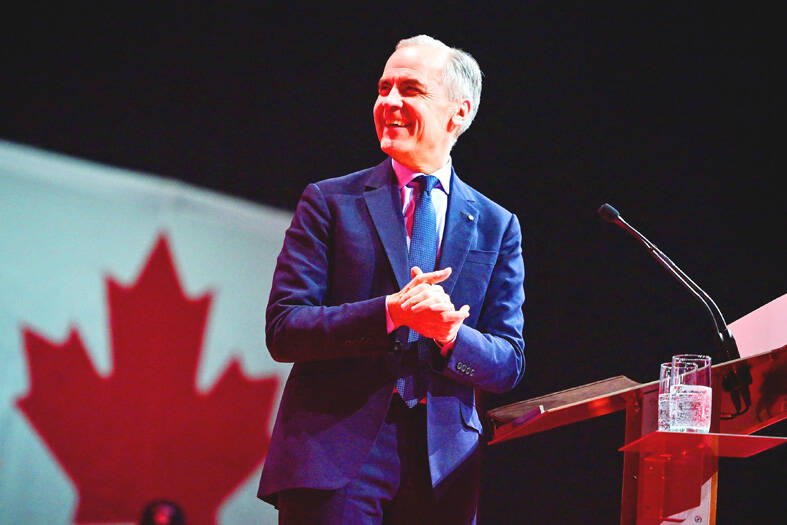A Canadian public policy institute has urged the Ottawa government to drop its long-standing diplomatic ambiguity over Taiwan’s status and take a clear stance in support of Taiwan’s sovereignty and democracy.
The Macdonald-Laurier Institute (MLI), an Ottawa-based domestic and foreign policy think tank, made the recommendation in a report by Scott Simon released on Tuesday, the day after Canadian Prime Minister Mark Carney’s Liberal Party won the federal election, but fell short of securing a parliamentary majority.
“Canada needs clarity about the international status of Taiwan in order to recalibrate policies in changing circumstances,” the report’s executive summary said.

Photo: Reuters
The People’s Republic of China’s (PRC) intention to “annex Taiwan, which it has never controlled” represents a “substantial risk” to Canada, it said.
Canada’s approach to China’s claim over Taiwan has relied on what it called “diplomatic expediency,” the institute said, adding that since establishing ties with the PRC in 1970, Canada has only agreed to “take note” of Beijing’s position on Taiwan, while neither endorsing nor challenging it.
Canadian courts have treated Taiwan as a de facto state in legal rulings, despite the lack of formal diplomatic recognition, and “Canadian policy is already based on the knowledge that Taiwan is completely autonomous from PRC rule,” the report said.
Taiwan “meets all the criteria for statehood” under the Montevideo Convention, the institute said, referring to a 1933 international treaty that defines a state as having a permanent population, defined territory, government and capacity to enter into relations with other states.
The PRC is “trying to convince the world that Taiwan has always been an integral part of China” by claiming that UN General Assembly Resolution 2758 gave it sovereignty over Taiwan, the report said, calling the claim “blatant misinformation.”
“The resolution does not even mention Taiwan,” it said.
China’s legal strategy — described as “international lawfare” — is designed to prevent the UN from supporting Taiwan in the event of conflict, as it did with Ukraine following the 2022 Russian invasion, it said.
The report urged Ottawa to publicly distinguish between Canada’s “one China policy” and the “one China principle” that the PRC “wants to impose on the world.”
“Canada has the right to define that policy and determine our own relationship with Taiwan without external interference,” it said.
The institute also called on the Canadian government to conduct regular naval transits of the Taiwan Strait, which it said constitute international waters under international law, and to assert the importance of peace and freedom of navigation in the region as a global public good.
The report further recommended increased cooperation with Taiwan, Japan, South Korea and the Philippines on defense, law enforcement and intelligence sharing to “collectively deter Chinese aggressive actions.”
To bolster Taiwan’s economic resilience, the institute advised expanding bilateral trade and investment in critical areas, such as semiconductors, artificial intelligence, and strategic mineral and energy supply chains.
Such efforts would help “lay the groundwork for the people of Taiwan to eventually fully exercise their right to self determination as promised in international law,” it said.

A preclearance service to facilitate entry for people traveling to select airports in Japan would be available from Thursday next week to Feb. 25 at Taiwan Taoyuan International Airport, Taoyuan International Airport Corp (TIAC) said on Tuesday. The service was first made available to Taiwanese travelers throughout the winter vacation of 2024 and during the Lunar New Year holiday. In addition to flights to the Japanese cities of Hakodate, Asahikawa, Akita, Sendai, Niigata, Okayama, Takamatsu, Kumamoto and Kagoshima, the service would be available to travelers to Kobe and Oita. The service can be accessed by passengers of 15 flight routes operated by

Chinese spouse and influencer Guan Guan’s (關關) residency permit has been revoked for repeatedly posting pro-China videos that threaten national security, the National Immigration Agency confirmed today. Guan Guan has said many controversial statements in her videos posted to Douyin (抖音), including “the red flag will soon be painted all over Taiwan” and “Taiwan is an inseparable part of China,” and expressing hope for expedited reunification. The agency last year received multiple reports alleging that Guan Guan had advocated for armed reunification. After verifying the reports, the agency last month issued a notice requiring her to appear and explain her actions. Guan

GIVE AND TAKE: Blood demand continues to rise each year, while fewer young donors are available due to the nation’s falling birthrate, a doctor said Blood donors can redeem points earned from donations to obtain limited edition Formosan black bear travel mugs, the Kaohsiung Blood Center said yesterday, as it announced a goal of stocking 20,000 units of blood prior to the Lunar New Year. The last month of the lunar year is National Blood Donation Month, when local centers seek to stockpile blood for use during the Lunar New Year holiday. The blood demand in southern Taiwan — including Tainan and Kaohsiung, as well as Chiayi, Pingtung, Penghu and Taitung counties — is about 2,000 units per day, the center said. The donation campaign aims to boost

The Central Weather Administration (CWA) said a magnitude 4.9 earthquake that struck off the coast of eastern Taiwan yesterday was an independent event and part of a stress-adjustment process. The earthquake occurred at 4:47pm, with its epicenter at sea about 45.4km south of Yilan County Hall at a depth of 5.9km, the CWA said. The quake's intensity, which gauges the actual effects of a temblor, was highest in several townships in Yilan and neighboring Hualien County, where it measured 4 on Taiwan's seven-tier intensity scale, the CWA said. Lin Po-yu (林柏佑), a division chief at the CWA's Seismological Center, told a news conference